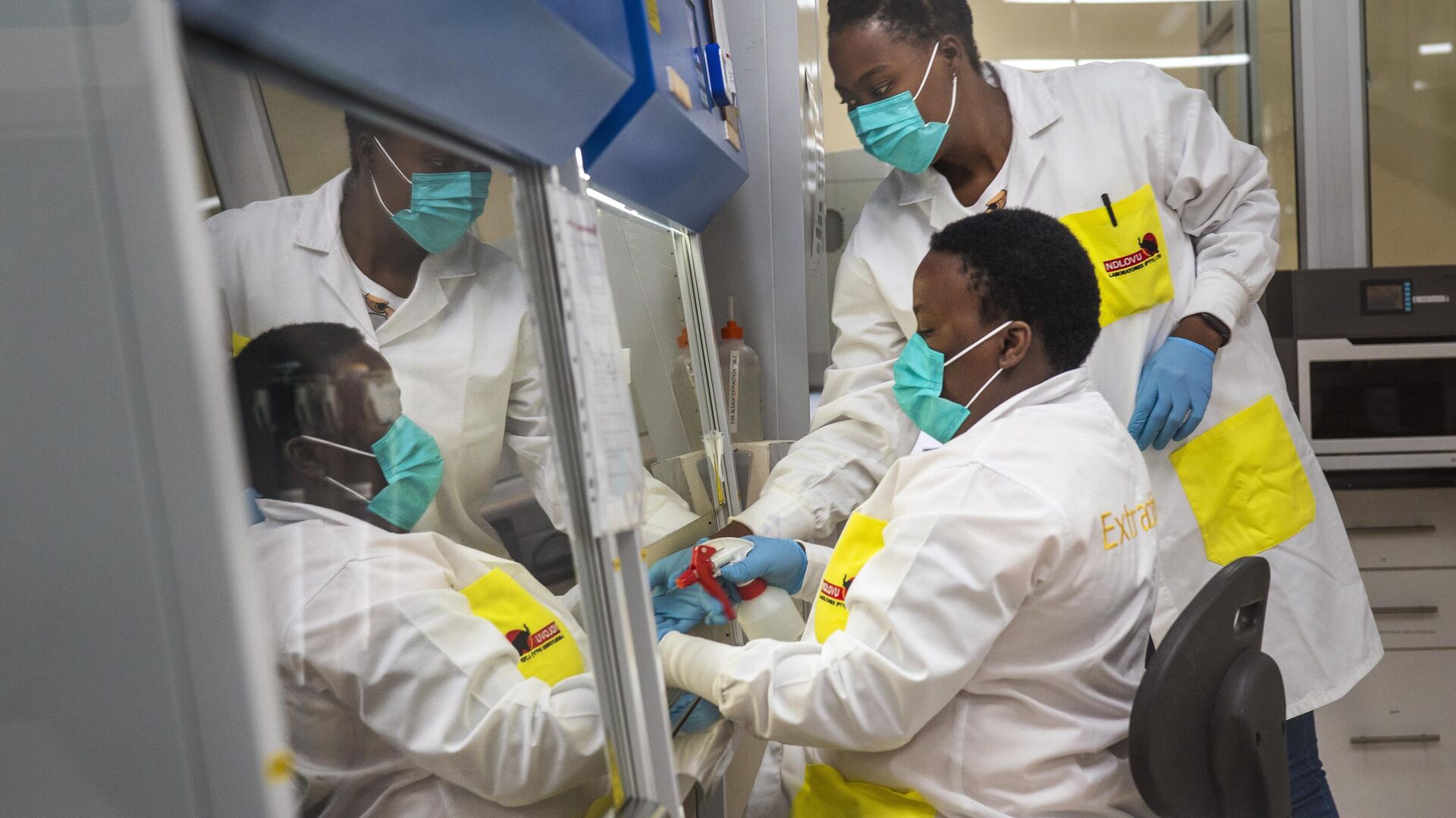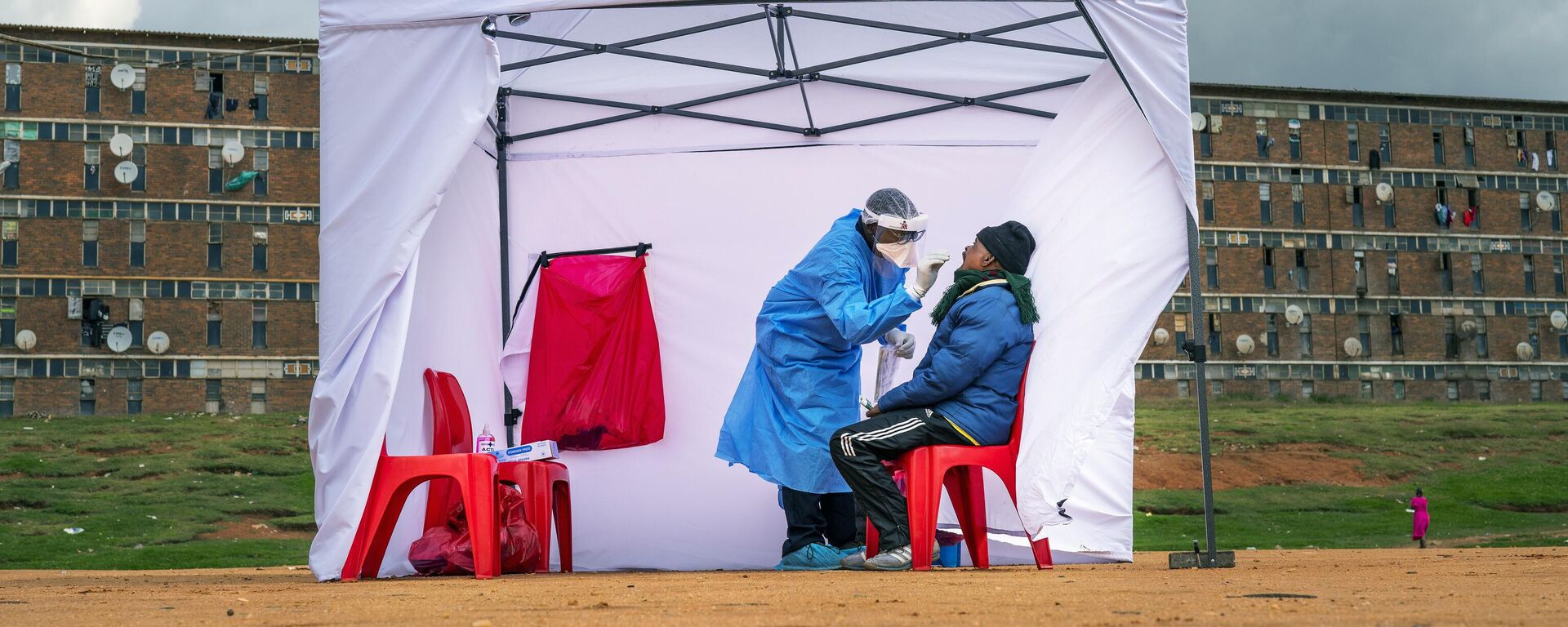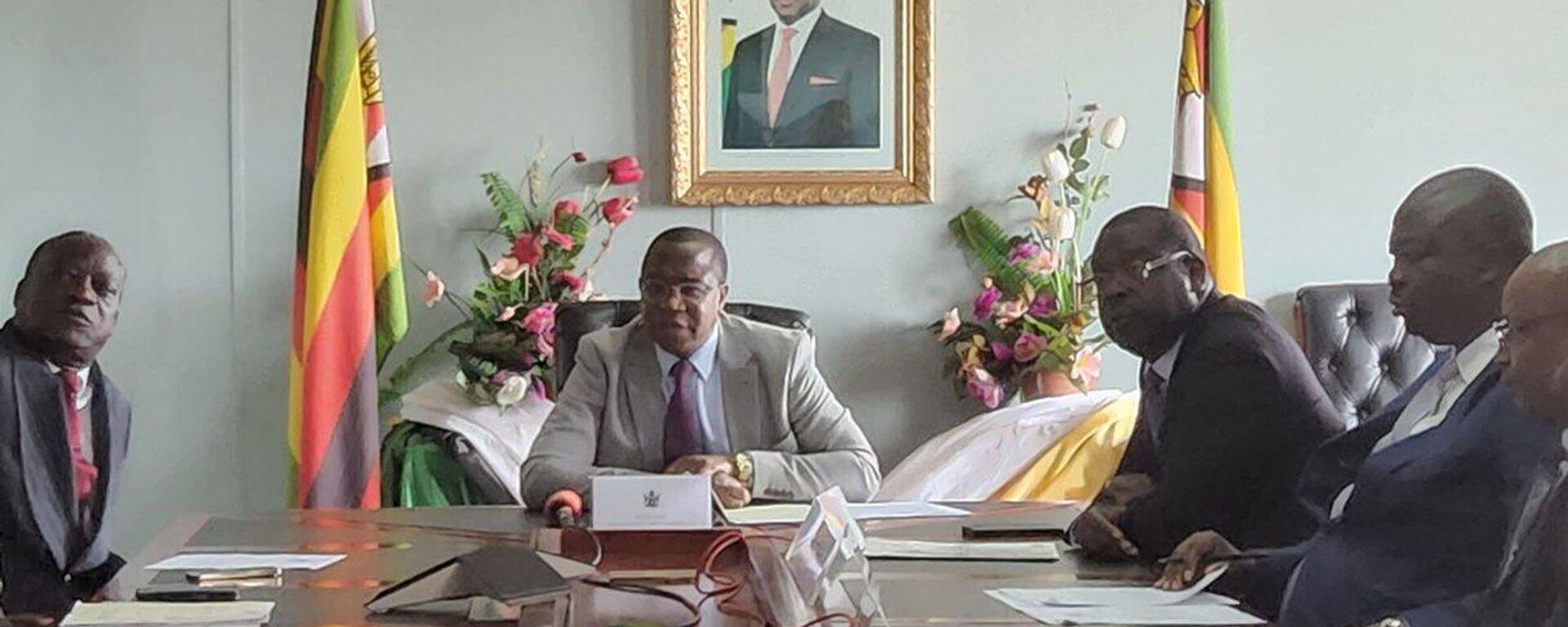https://sputnikglobe.com/20230408/heal-yourself-before-healing-others-sa-med-students-on-health-day-warn-of-doctor-burnout-risks-1109263044.html
'Heal Yourself Before Healing Others': SA Med Students on Health Day Warn of Doctor Burnout Risks
'Heal Yourself Before Healing Others': SA Med Students on Health Day Warn of Doctor Burnout Risks
Sputnik International
The World Health Day is celebrated every year on April 7 to draw worldwide attention to healthcare issues. On this occasion, Sputnik sat down with final year medical students to discuss the importance of medical profession.
2023-04-08T11:59+0000
2023-04-08T11:59+0000
2023-04-08T12:45+0000
africa
southern africa
south africa
medicine
medical care
medical facilities
medical study
world health organization (who)
healthcare
health
https://cdn1.img.sputnikglobe.com/img/07e7/04/08/1109267100_0:161:3069:1887_1920x0_80_0_0_2db54b1e17675df30ca4c82061f990c7.jpg
As healthcare workers around the globe increasingly struggle with various psychological health issues and burnout, more attention should be placed on their well-being, said Thembakazi Potelwa, a final year MBChB student at Stellenbosch University, South Africa, in an interview with Sputnik.Potelwa explained that doctors who work in public health and government organizations in particular are often very exhausted and overworked. This way of living is not healthy, she stressed, saying that when doctors stay up for two days in a row, they are "not really useful," when it comes to treating their patients. She also pointed out that the attitude seen in many healthcare systems, when doctors are considered to be "self-serving or just almost immoral" for taking several days off as sick leave.On World Health Day, the future doctor wished that all her colleagues would put their own health first. The same message was conveyed by Nondumiso Mngomezulu, who is also a final year MBChB student at Stellenbosch Univeristy, saying that it is extremely important for doctors to take care of themselves first, so that they can help their patients in the best way possible. She asserted that mental wellness should be encouraged among health workers all over the world, as most of them have no time for themselves and often experience compassion fatigue and persistent burnout. Therefore, their priority must be: "healing yourself before healing others." Dedication and Perseverance in Pursuit of One's 'Dream Job'Potelwa, talking about her decision to become a doctor, explained that she has always been interested in how the human body works, yearning to know more about this "fantastic piece of machinery." She wanted to find out "how things work, what happens when they don't work, and how to fix it." Moreover, she added that there was no other field she cared about enough to put so much effort and dedication into. So she chose to go down this laborious path to study medicine, because she genuinely wanted to. It is well-known that studying medicine is not easy, and med students often face various hardships along their way. However, Potelwa explained that the content itself is not very difficult, but the amount of information every med student has to memorize and be able to use in practice is enormous. She also stated that many medical students experience an imposter syndrome, when they feel like they will never be good enough to be a doctor. With much work to be done, and a vast amount of information to absorb, they sometimes may become depressed and lose hope. Potelwa herself struggled with such lows during her second year. However, she emphasized, despite all these difficulties and pressures that she faces mostly "internally," she really enjoys studying medicine and is passionately pursuing a career in this field. Potelwa reiterated that it's always been her dream to become a doctor. What she really likes about this profession is a "human aspect to it." Potelwa has always strived to be a part of a community, to know people's real stories, to find out more about their lives and aspirations, and somehow help people cope with their hardships. She stated that this interaction between a doctor and their patients is of "an intimate" nature, because patients entrust healthcare workers with the most precious thing they have – their life. The human aspect of being a doctor also encouraged another interviewee of ours. Mngomezulu at first wanted to be a pilot, however, over time her priorities significantly changed. Eventually, she realized that medicine was her calling. To a certain extent, her mother, who is a nursing educator, and was initially a nurse, influenced her decision. She noted that her mother's patients often recognize her on the streets and "come up to her just to say thank you for her care during their stay." She recalled that the second year of studying was "a rough" one, but the memories about her father, who passed away five years ago, encouraged her to go on. Mngomezulu explained that he always told her how proud he was of her, and therefore, she didn't want to disappoint him and persevered. Back then, she used to say to herself, "I would cry, but then I would get up and do what I needed to do." As of now, she said that she truly loves her job, further elaborating that seeing patients gives her purpose in life and makes her "feel fulfilled." So, she highlighted, it's mainly about passion and dedication. South Africa's Healthcare - A Case Study Potelwa, talking about studying medicine in South Africa, underscored that it is as relevant as ever. According to her, the condition of the country's healthcare system pushes doctors to think in terms of how "treat patients and manage patients when you don't have access to all the equipment and the resources that you want."Moreover, working as a doctor in this country requires certain skills and different approaches to patients. She explained that a healthcare employee must think about patients' abilities as well, including such aspects as whether "they can read the prescription that you're writing" or whether they "have enough money to afford the procedure you're prescribing."She also noted that due to a high level of interpersonal violence in the country, there are a lot of different traumatic injuries doctors have to deal with. Therefore, studying in South Africa can be considered to be a huge challenge, but simultaneously, she underlined, it "allows you to grow through the pressures that you've been forced into."Talking about future plans, Potelwa revealed that her biggest dream is to open a health center in the township where her father, who is also a doctor, works. She added that she wants to help the community by building a big hospital where all people of the township would be treated. South Africa, she explained, is a very resource-limited country, and therefore it is a natural feeling of her "to give more to the people."Mngomezulu echoed her remarks, noting that the country lacks human resources. She elaborated that healthcare workers are often "burnt out, underpaid, [and] under-resourced," while patients don't get the best care. She emphasized that South Africa is in a great need for doctors. However, today doctors are graduating and leaving the country, while specialists are retiring. While drawing attention to these problems, she ended the interview on a positive note – with a World Health Day wish for doctors to become game-changes.
https://sputnikglobe.com/20230309/second-phase-of-africa-women-health-champions-initiative-launched-by-who-unv-1108203858.html
https://sputnikglobe.com/20230330/zimbabwe-receives-loan-from-south-africa-to-develop-health-infrastructure-1108953344.html
africa
southern africa
south africa
Sputnik International
feedback@sputniknews.com
+74956456601
MIA „Rossiya Segodnya“
2023
News
en_EN
Sputnik International
feedback@sputniknews.com
+74956456601
MIA „Rossiya Segodnya“
Sputnik International
feedback@sputniknews.com
+74956456601
MIA „Rossiya Segodnya“
southern africa, south africa, medical student, world health day, healthcare system, health, staff shortages
southern africa, south africa, medical student, world health day, healthcare system, health, staff shortages
'Heal Yourself Before Healing Others': SA Med Students on Health Day Warn of Doctor Burnout Risks
11:59 GMT 08.04.2023 (Updated: 12:45 GMT 08.04.2023) World Health Day is celebrated annually on April 7 to draw worldwide attention to healthcare issues. On this occasion, Sputnik sat down with South African senior year med students, who shared with us their desires, dreams and hopes in pursuing this career, as well as discussed the medical profession's significance and relevance nowadays.
As healthcare workers around the globe increasingly struggle with various psychological health issues and burnout, more attention should be placed on their well-being, said Thembakazi Potelwa, a final year MBChB student at Stellenbosch University, South Africa, in an interview with Sputnik.
Potelwa explained that doctors who work in public health and government organizations in particular are often very exhausted and
overworked. This way of living is not healthy, she stressed, saying that when doctors stay up for two days in a row, they are "not really useful," when it comes to treating their patients.
She also pointed out that the attitude seen in many healthcare systems, when doctors are considered to be "self-serving or just almost immoral" for taking several days off as sick leave.
"So I think that we need to do away with those kinds of attitudes and just remember that we can't give from an empty cup," the med student stressed, adding: "It takes a little bit of personal responsibility to keep ourselves healthy, well and sane."
On World Health Day, the future doctor wished that all her colleagues would put their own health first. The same message was conveyed by Nondumiso Mngomezulu, who is also a final year MBChB student at Stellenbosch Univeristy, saying that it is extremely important for doctors to take care of themselves first, so that they can help their patients in the best way possible.
She asserted that
mental wellness should be encouraged among health workers all over the world, as most of them have no time for themselves and often experience compassion fatigue and persistent burnout. Therefore, their priority must be: "healing yourself before healing others."
Dedication and Perseverance in Pursuit of One's 'Dream Job'
Potelwa, talking about her decision to become a doctor, explained that she has always been interested in how the human body works, yearning to know more about this "fantastic piece of machinery." She wanted to find out "how things work, what happens when they don't work, and how to fix it."
Moreover, she added that there was no other field she cared about enough to put so much effort and dedication into. So she chose to go down this laborious path to study medicine, because she genuinely wanted to.
It is well-known that studying medicine is not easy, and med students often face various hardships along their way. However, Potelwa explained that the content itself is not very difficult, but the amount of information every med student has to memorize and be able to use in practice is enormous.
She also stated that many medical students experience an imposter syndrome, when they feel like they will never be good enough to be a doctor. With much work to be done, and a vast amount of information to absorb, they sometimes may become depressed and lose hope. Potelwa herself struggled with such lows during her second year.
However, she emphasized, despite all these difficulties and pressures that she faces mostly "internally," she really enjoys studying medicine and is passionately pursuing a career in this field. Potelwa reiterated that it's always been her dream to become a doctor.
"And I feel like having, especially gone through all the hardships and the difficulties along the way, I owe it to myself to see it to completion and just to get the job done," the aspiring doctor-to-be said.
What she really likes about this profession is a "human aspect to it." Potelwa has always strived to be a part of a community, to know people's real stories, to find out more about their lives and aspirations, and somehow help people cope with their hardships. She stated that this interaction between a doctor and their patients is of "an intimate" nature, because patients entrust healthcare workers with the most precious thing they have – their life.
The human aspect of being a doctor also encouraged another interviewee of ours. Mngomezulu at first wanted to be a pilot, however, over time her priorities significantly changed. Eventually, she realized that medicine was her calling. To a certain extent, her mother, who is a nursing educator, and was initially a nurse, influenced her decision. She noted that her mother's patients often recognize her on the streets and "come up to her just to say thank you for her care during their stay."
"I think that's the kind of person I want to be known and remembered as. That made me decide this is what I want to do," she stated.
She recalled that the second year of studying was "a rough" one, but the memories about her father, who passed away five years ago, encouraged her to go on. Mngomezulu explained that he always told her how proud he was of her, and therefore, she didn't want to disappoint him and persevered. Back then, she used to say to herself, "I would cry, but then I would get up and do what I needed to do."
As of now, she said that she truly loves her job, further elaborating that seeing patients gives her purpose in life and makes her "feel fulfilled." So, she highlighted, it's mainly about passion and dedication.
South Africa's Healthcare - A Case Study
Potelwa, talking about studying medicine in South Africa, underscored that it is as relevant as ever. According to her, the condition of the country's
healthcare system pushes doctors to think in terms of how "treat patients and manage patients when you don't have access to all the equipment and the resources that you want."
Moreover, working as a doctor in this country requires certain skills and different approaches to patients. She explained that a healthcare employee must think about patients' abilities as well, including such aspects as whether "they can read the prescription that you're writing" or whether they "have enough money to afford the procedure you're prescribing."
She also noted that due to a high level of
interpersonal violence in the country, there are a lot of different traumatic injuries doctors have to deal with. Therefore, studying in South Africa can be considered to be a huge challenge, but simultaneously, she underlined, it "allows you to grow through the pressures that you've been forced into."
"Lots of violence in this country, so there's always a suture that needs to be put in. There's just always something to do, something practical for students to do in practice and just interesting cases to see," she stated.
Talking about future plans, Potelwa revealed that her biggest dream is to open a health center in the township where her father, who is also a doctor, works. She added that she wants to help the community by building a big hospital where all people of the township would be treated. South Africa, she explained, is a very resource-limited country, and therefore it is a natural feeling of her "to give more to the people."
Mngomezulu echoed her remarks, noting that the country lacks human resources. She elaborated that healthcare workers are often "burnt out,
underpaid, [and] under-resourced," while patients don't get the best care. She emphasized that South Africa is in a great need for doctors. However, today doctors are graduating and
leaving the country, while specialists are retiring.
While drawing attention to these problems, she ended the interview on a positive note – with a World Health Day wish for doctors to become game-changes.
"My wish to future doctors is that they are game changers [...]. So I wish our future doctors to be trailblazers for something new, to completely change the face of healthcare," the med student concluded.




